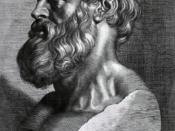Medical historians generally look to Hippocrates as the founder of medicine as a rational science. It was Hippocrates who finally freed medicine from the shackles of magic, superstition, and the supernatural.
Hippocrates compiled data and conducted experiments to show that disease was a natural process; the signs and symptoms of a disease were caused by the natural reactions of the body to the disease process; and that the chief role of the physician was to aid the natural resistance of the body to overcome the imbalance and restore health and harmony to the organism. [1: http://www.greekmedicine.net/whos_who/Hippocrates.html]
In Western medicine, the name Hippocrates has always stood for an ethical ideal. That of compassion, discreetness, ethics and selflessness. And those who graduate from medical schools, still subscribe to a version of his oath. Although Hippocrates is no longer assumed a repository of all medical wisdom, his importance still remains in his writings.
They teach of the ethical ideals of the physician, insight into the origins and development of medical rationale and their influence over medical thought, spanning over a multitude of centuries. [2: Hippocratic Writings, Page 9]
Hippocrates was the pioneer in carefully documenting and thoughtfully interpreting case studies, an
essential prerequisite to the coupling of clinical, physiologic, and pathologic features of diseases in the practice of medicine that characterized the beginning of modern scientific medicine in the Renaissance.[3: Hippocrates and Cardiology; Tsung O. Cheng, MD Washington, DC]
In his writings, Hippocrates mentioned and described several diseases for the first time. This report will spotlight a handful of these writings, along with diagnoses and treatments and compare them with today's findings, diagnoses and treatments. Hippocrates belonged to a very ancient age when medicinal therapy was not known or existed in a very immature state; but his findings, treatment and...


